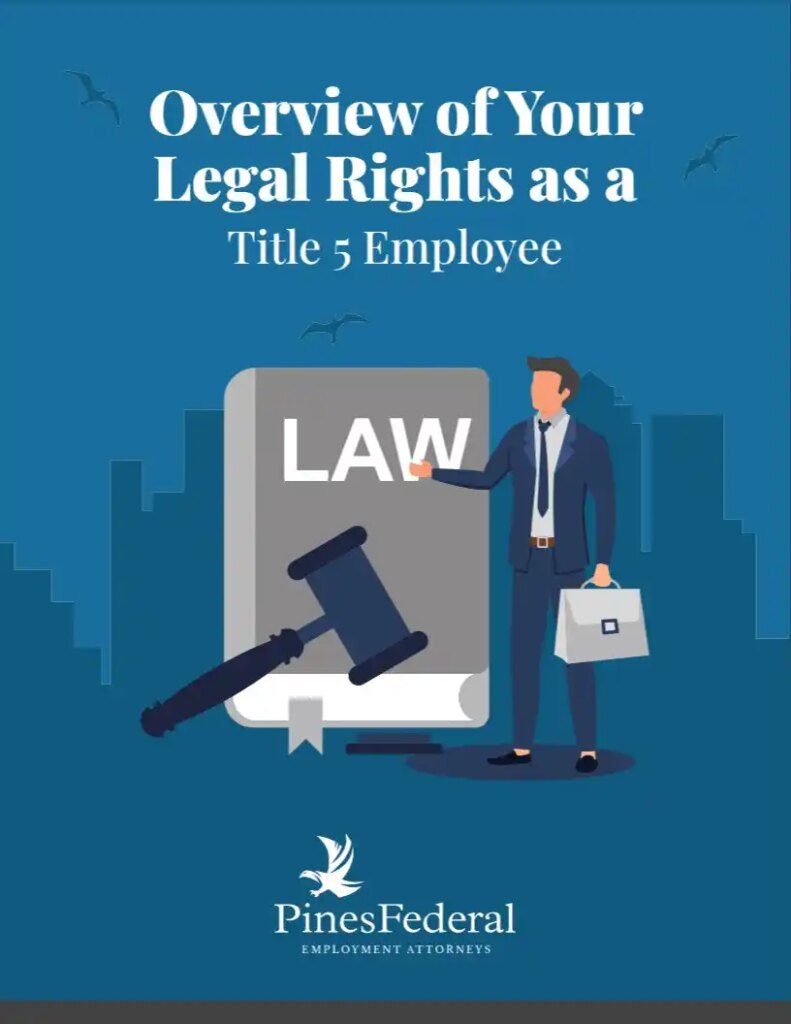
As a Title 5 federal employee, it can be disheartening and overwhelming to receive notice of proposed removal from your job.
However, it’s important to know you have legal rights and options to fight such a decision, even as a fired federal employee. This article will discuss your rights when you’ve been terminated from the federal government.
We’ll address questions we often hear from employees, including:
- Is it hard to get fired from a government job?
- Can I be fired from a federal job during probation?
- Do federal employee termination laws apply to all government workers?
We will also explore how you can contest a proposed removal and how our experienced team of federal employment lawyers can help.
Please call (800) 801-0598 or fill out our online form today for a consultation.
What Rights Do I Have as a Fired Federal Employee?
As a federal employee, a number of laws and regulations work together to protect you from arbitrary termination. These laws also work to protect you from discrimination or retaliation in the workplace.
The most important of these laws include the Civil Service Reform Act, the Americans with Disabilities Act, and Title VII of the Civil Rights Act of 1964. However, all these laws combine to enshrine rights given to you by the Constitution.
Under these laws, you have the following rights as a federal employee:
- The Right to Due Process. Before effecting your termination, your employer must give you at least 30 days’ advance notice and a detailed description of your alleged misconduct. They must also allow you to respond to the proposed notice and review the evidence that they relied upon.
- The Right to Appeal. You also have the right to appeal your case to the Merit Systems Protection Board (MSPB), an independent federal agency that handles appeals from federal employees who have been fired, demoted, or faced other adverse actions. The MSPB is responsible for ensuring that all federal personnel actions cohere with the merit system principles of fairness, impartiality, and justice.
- The Right to Representation. Federal employees have the right to be represented by counsel, which can be a private attorney, friend, or union representative, during the appeals process. Your right to representation begins the moment your employer first proposes your removal.
- The Right to Reinstatement. If you successfully appeal your employer’s removal action, your employer must reinstate you to your job along with back pay and benefits.
- The Right to File a Complaint. In many cases, you also enjoy the right to file a complaint with the Office of Special Counsel (OSC). OSC is an independent federal agency that investigates and prosecutes violations of federal employment laws, including whistleblower retaliation.
Knowing that you have these rights is important. However, it is equally important to utilize them as a federal employee.


“I was issued a proposed removal letter at the VA where I work as a nurse, and I didn’t know what to do. Pines Federal were ready to defend me to the end. This law firm is the best federal government firm out there. I will be spreading the news to my friends and coworkers…”
Is It Hard to Get Fired from a Government Job?
Firing a federal employee is significantly more difficult than firing an employee in the private sector.
Whereas private sector employers can often fire their employees without cause, federal employers must abide by federal law and regulations.
Practically speaking, your employer has to thoroughly document your alleged performance or misconduct in writing before taking action.
What If I Am Fired from a Federal Job During Probation?
Probationary federal employees enjoy fewer rights than other federal employees.
However, there are some situations in which they can appeal to the MSPB.
Probationary employees can also submit complaints to the Equal Employment Opportunity Commission (EEOC) and the OSC. If your employer fires you during your probationary period, contact a qualified attorney right away.
Fighting a Proposed Removal as a Federal Employee
Unlike private-sector workers, federal employees can’t be fired instantly. Government agencies must follow a specific procedure to fire someone. This process requires them to have documented performance- or conduct-based reasons for removing an employee. It also requires them to allow an employee to challenge a removal before they’re officially terminated from a federal government job.
Let’s walk through the steps involved in contesting a potential termination.
Review the Proposed Removal Letter
Understanding the specific behavioral or performance issues your agency alleges is essential for preparing a strategic response. Your agency must give you a notice of proposed removal that outlines why you’re being terminated. Read this thoroughly and closely to ensure you understand the case against you.
Gather Evidence to Support Your Case
Collect evidence that can help challenge your agency’s proposed reasons for firing you. This could include documents, emails, letters, performance reviews, and witness statements.
A fired federal employee has the right to review the evidence an agency holds against them. Sometimes, an agency will include this information in the notice of proposed removal. Otherwise, the notice should explain how you can request any documents and testimony your employer relied on when making its decision. Getting access to this evidence is critical for building a well-rounded defense.
Respond to the Allegations
Prepare a written or oral response to the case against you and submit it to your agency. Employees typically have between 7 and 30 days to file a response. In your response, address each element or incident in the proposed removal notice.
Explain extenuating circumstances that could add context to your behavior depending on the situation. In some cases, compelling mitigating factors may help downgrade a proposed termination into a less severe adverse action, such as suspension or demotion.
Include as much relevant evidence as possible to support your case.
Consider Next Steps
After reviewing your response and evidence, the agency will decide whether to uphold, reduce, or dismiss the proposed termination. Your agency’s final decision notice should outline the specific reasons for their actions.
It should also explain the avenues available to appeal to or further challenge this decision.
Employees can generally appeal their termination to the MSPB on the grounds that:
- The termination was not based on just cause,
- The agency didn’t follow the required removal procedures, and
- The removal was too severe a penalty for the offense.
If you believe your termination was motivated by illegal discrimination or retaliation, the MSPB appeal process may also involve additional agencies, such as the EEOC and the OSC.
Evidence to Fight a Proposed Removal
Strong evidence is central to building a compelling case against a proposed removal.
Some forms of evidence that can help strengthen your case include:
- Emails and letters—written communications that can help illustrate discriminatory motives or disprove an agency’s cause for termination;
- Performance reviews—records of positive evaluations and work history to contradict claims of poor performance;
- Attendance records—timesheets and other documents that can challenge allegations of tardiness or attendance issues;
- Employee contract or handbook—documentation of agency expectations and procedures can help clarify and defend your behavior;
- Medical records—doctor’s notes and other official medical documentation can support claims of discrimination due to disability or pregnancy;
- Whistleblower reports—documentation of complaints made to legal or agency authorities about unlawful or unethical conduct; and
- Witness statements—testimony from coworkers who received more favorable treatment in similar situations or can speak to an agency’s history of discrimination.
The type of evidence you need can vary depending on the facts of the case, including your grounds for challenging the termination.
Do These Rights Apply to All Federal Employees?
It’s vital to note that these rights apply to federal employees hired under Title 5 of the US Code—virtually all federal employees fall under Title 5.
However, some Veterans Administration and National Institutes of Health (NIH) employees fall under Title 38. Title 38 employees have different legal rights, working conditions, and pay scales than Title 5 employees.
If you think you might be a Title 38 federal employee, contact one of our federal employment lawyers today.
Frequently Asked Questions About Termination for Federal Employees
Here are some inquiries we frequently receive from federal employees facing removal. However, if you have detailed questions about your case, it’s best to speak to an attorney.
What Are Legal Reasons for Firing a Federal Employee?
Unlike many private employers, federal agencies must have cause for terminating a government employee. This means the agency must have a legitimate and documented reason why the employee is unfit for their role. For example, consistently unacceptable job performance can be a just cause for removing a federal employee. Other serious reasons for termination include insubordination, harassment, illegal activity, security breaches, and other behavioral misconduct.
What Happens If I’m Removed from a Federal Job?
Fired federal employees typically lose access to employment benefits like health and life insurance. If your termination was due to misconduct or criminal activity, you may also lose the ability to receive unemployment benefits or severance pay.
Do I Need a Lawyer to Fight a Proposed Termination?
Federal employees aren’t required to hire legal counsel to fight a proposed removal. However, the support and advocacy of an experienced attorney can significantly impact your chances of avoiding termination.
How Our Federal Employment Lawyers Can Help
At Pines Federal, we have a team of experienced attorneys who focus on representing federal employees. We understand the challenges you’re facing, and we are ready to fight for your rights.
Our attorneys have extensive experience representing clients in a wide range of federal employment disputes and are highly knowledgeable about the laws and regulations surrounding federal employment.
Furthermore, our team of experienced attorneys has a proven track record of success in helping federal employees like you fight unjust removals. And we’re committed to using our expertise to help you achieve the best possible outcome in your case.
When you consult with us, we will work closely with you to help you understand your case. We’ll then develop and carry out a strategy tailored to your needs and the facts of your case.
We’ll help you gather evidence, prepare your response, and represent you in administrative proceedings. At every stage of the legal process, we’ll fight for your rights and do what it takes to get you justice.
Contact us online or call (800) 801-0598 today to schedule a consultation and learn more about how we can help you.
[DOWNLOAD] Legal Rights for Title 5 Employees
